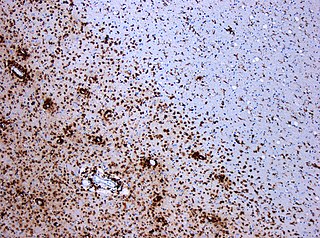
Luxembourg, officially the Grand Duchy of Luxembourg, is a landlocked country in Western Europe. It is bordered by Belgium to the west and north, Germany to the east, and France to the south. Its capital and most populous city, Luxembourg City, is one of the four institutional seats of the European Union and the seat of several EU institutions, notably the Court of Justice of the European Union, the highest judicial authority. Luxembourg's culture, people, and languages are greatly influenced by its much larger neighbors France and Germany; for example, Luxembourgish, a Germanic language, is the only national language of the Luxembourgish people and of the Grand Duchy of Luxembourg, French is the only language for legislation, and all three – Luxembourgish, German and French – are used for administrative matters in the country.

Multiple sclerosis (MS) is an autoimmune disease resulting in damage to the insulating covers of nerve cells in the brain and spinal cord. As a demyelinating disease, MS disrupts the nervous system's ability to transmit signals, resulting in a range of signs and symptoms, including physical, mental, and sometimes psychiatric problems. Symptoms include double vision, vision loss, eye pain, muscle weakness, and loss of sensation or coordination. MS takes several forms, with new symptoms either occurring in isolated attacks or building up over time. In relapsing forms of MS symptoms may disappear completely between attacks, although some permanent neurological problems often remain, especially as the disease advances. In progressive forms of MS, bodily function slowly deteriorates once symptoms manifest and will steadily worsen if left untreated.

Schengen is a small wine-making village and commune in far south-eastern Luxembourg, on the western bank of the river Moselle. The commune border includes the tripoint where the borders of Germany, France, and Luxembourg meet.

Fingolimod, sold under the brand name Gilenya, is an immunomodulating medication, used for the treatment of multiple sclerosis. Fingolimod is a sphingosine-1-phosphate receptor modulator, which sequesters lymphocytes in lymph nodes, preventing them from contributing to an autoimmune reaction. It has been reported to reduce the rate of relapses in relapsing-remitting multiple sclerosis by approximately one-half over a two-year period.

Natalizumab, sold under the brand name Tysabri among others, is a medication used to treat multiple sclerosis and Crohn's disease. It is a humanized monoclonal antibody against the cell adhesion molecule α4-integrin. It is given by intravenous infusion. The drug is believed to work by reducing the ability of inflammatory immune cells to attach to and pass through the cell layers lining the intestines and blood–brain barrier.

The University of Luxembourg is a public research university in Luxembourg.

Lesbian, gay, bisexual, transgender, and queer (LGBTQ) people in Luxembourg have the same legal rights as non-LGBTQ people. Partnerships, which grant many of the benefits of marriage, have been recognised since 2004. In June 2014, the Luxembourgish Parliament passed a law enabling same-sex marriage and adoption rights, which took effect on 1 January 2015. Additionally, discrimination on the basis of sexual orientation and "change of sex" in employment, healthcare and the provision of goods and services is outlawed, and transgender people are allowed to change their legal gender on the basis of self-determination.
Multiple sclerosis (MS) is a chronic inflammatory demyelinating disease that affects the central nervous system (CNS). Several therapies for it exist, although there is no known cure.

Glatiramer acetate, sold under the brand name Copaxone among others, is an immunomodulator medication used to treat multiple sclerosis. Glatiramer acetate is approved in the United States to reduce the frequency of relapses, but not for reducing the progression of disability. Observational studies, but not randomized controlled trials, suggest that it may reduce progression of disability. While a conclusive diagnosis of multiple sclerosis requires a history of two or more episodes of symptoms and signs, glatiramer acetate is approved to treat a first episode anticipating a diagnosis. It is also used to treat relapsing-remitting multiple sclerosis. It is administered by subcutaneous injection.

Marburg acute multiple sclerosis, also known as Marburg multiple sclerosis or acute fulminant multiple sclerosis, is considered one of the multiple sclerosis borderline diseases, which is a collection of diseases classified by some as MS variants and by others as different diseases. Other diseases in this group are neuromyelitis optica (NMO), Balo concentric sclerosis, and Schilder's disease. The graver course is one form of malignant multiple sclerosis, with patients reaching a significant level of disability in less than five years from their first symptoms, often in a matter of months.

Multiple sclerosis can cause a variety of symptoms varying significantly in severity and progression among individuals: changes in sensation (hypoesthesia), muscle weakness, abnormal muscle spasms, or difficulty moving; difficulties with coordination and balance; problems in speech (dysarthria) or swallowing (dysphagia), visual problems, fatigue and acute or chronic pain syndromes, bladder and bowel difficulties, cognitive impairment, or emotional symptomatology. The main clinical measure in progression of the disability and severity of the symptoms is the Expanded Disability Status Scale or EDSS.

The Kurtzke Expanded Disability Status Scale (EDSS) is a method of quantifying disability in multiple sclerosis. The scale has been developed by John F. Kurtzke. The EDSS is based on a neurological examination by a clinician. However, a number of versions have been developed which enable patient self-administration.

The National Library of Luxembourg, abbreviated as BnL, is Luxembourg's national library. It was founded in its current form in 1899, as a result of a series of different institutions originating in the 18th century. It is located in the Kirchberg district of Luxembourg City. The BnL is a public establishment under the supervision of the Ministry of Culture.
National Multiple Sclerosis Society, National Capital Chapter is a local chapter of the National Multiple Sclerosis Society. The National Capital Chapter, founded in 1957, promotes, researches, educates, and advocates on issues relating to multiple sclerosis. The organization also provides a wide range of programs, including support for the newly diagnosed and those living with MS in the Washington, D.C. metropolitan area as well. Along with Washington, D.C., its service area includes: Calvert, Charles, Montgomery, Prince George's and St. Mary's counties in Maryland; and Alexandria, Arlington, Fairfax, Fauquier, Loudoun, and Prince William counties in Virginia.
Malignant multiple sclerosis is used to describe MS patients who reach significant level of disability in a short period of time. Malignant MS cases are not common, less than 5% of patients with MS experience this type of progression.
Terry Lynn Wahls is an American physician and paleo diet advocate. She was an assistant chief of staff at Iowa City Veterans Administration Health Care and is a clinical professor of medicine at the University of Iowa. She has a private practice and conducts clinical trials. She was diagnosed with a chronic progressive neurological disorder and secondary progressive multiple sclerosis. Wahls is a promoter of functional medicine.
Irma Resendez is an American advocate and author who founded the bilingual multiple sclerosis non-profit organization Familia Unida Living with MS in 1998. In 2005, Resendez served as a commissioner on disabilities for the city of Los Angeles. In 2014, Resendez wrote Simply Amor: A Mother's Miracle Living with MS, a collection of her personal experiences.

Multiple sclerosis (MS) can be pathologically defined as the presence of distributed glial scars (scleroses) in the central nervous system that must show dissemination in time (DIT) and in space (DIS) to be considered MS lesions.
George Jelinek is an Australian doctor who is professor and founder, Neuroepidemiology Unit, Melbourne School of Population and Global Health. This unit expressly evaluates modifiable risk factors that predict the progression of Multiple sclerosis. He has served since 2017 as the Chief Editor for Neuroepidemiology in the journal Frontiers in Neurology, and he was Founding Editor – and is currently the Editor Emeritus – for Emergency Medicine Australasia. Jelinek also has the distinction of being the first Professor of Emergency Medicine in Australasia. Between 1987 and 2018, he published more than 150 peer-reviewed papers, seven book forewords and eight books, and received more than 20 research grants. He is a frequent invited speaker.

Tilly Metz is a Luxembourgish politician of the Green Party. After teaching humanities and social sciences, she was appointed as deputy director of the Lycée Technique pour Professions Educatives et Sociales (LTPES) in Mersch. She was the mayor of the municipality of Weiler-la-Tour (Luxembourg) and has been a Member of the European Parliament since June 2018, as part of the Greens/EFA political group. She is particularly known for her stance on animal welfare, health-related issues and human rights.
















